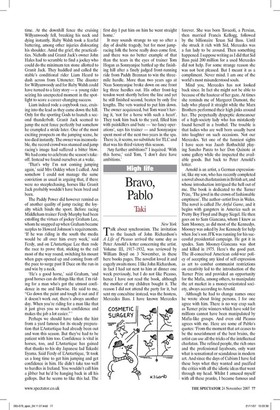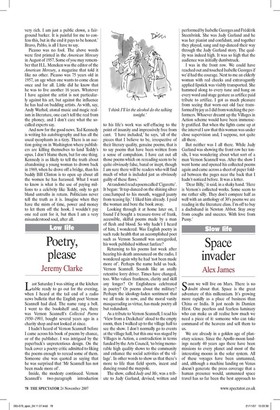Bravo, Pablo
Taki New York Talk about synchronism. The invitation 1 to the launch of John Richardson's A Life of Picasso arrived the same day as Peter Arnold's letter concerning the artist. Volume III, 1917-1932, was reviewed by William Boyd on 3 November, in these here books pages. The novelist loved it and eagerly awaits more. I like John Richardson, in fact I had sat next to him at dinner one week previously, but I do not like Picasso, hence I have not read the book, although the mother of my children bought it. The reason I did not attend the party for it, but sent my concubine instead, was the hostess, Mercedes Bass. I have known Mercedes forever. She was born Tavacoli, a Persian, then married Francis Kellogg, followed by the billionaire Texan Sid Bass. Until she struck it rich with Sid, Mercedes was a fun lady to be around. Then something happened. I suppose writing as I did that Sid Bass paid 200 million for a used Mercedes did not help. For some strange reason she was not best pleased. But I meant it as a compliment. Never mind. I am one of the world's most misunderstood souls.
Mind you, Mercedes has not looked back since. In fact she might not be able to because of the hauteur of her gaze. At times she reminds me of Margaret Dumont, the lady who played it straight while the Marx Brothers performed their high jinks around her. The perpetually dyspeptic demeanour of a high-society lady who has mistakenly found herself in a brothel. The trouble is that ladies who are well born usually burst into laughter on such occasions. Not our Mercedes. Yet one of the funniest sights I have seen was Jacob Rothschild playing Sancho Panza to her Don Quixote at some gallery while she inspected the available goods. But back to Peter Arnold's letter.
Arnold is an artist, a German expressionist, like my son, who has recently completed a novel about charlatanism in British art, and whose introduction intrigued the hell out of me. The book is dedicated to the Turner Prize, 'The jewel in the crown of fashionable emptiness'. The author–artist lives in Wales. The novel is called The Artful Game, and it begins with gangsters in America such as Pretty Boy Floyd and Bugsy Siegel. He then goes on to Sam Giancana, whom I knew as Sam Mooney, as did most of the Kennedys. Mooney was asked by Joe Kennedy for help when Joe's son JFK was running for his successful presidential campaign. He got it in spades. Sam Mooney-Giancana was shot and killed in 1975. Here's the good part. The ill-conceived American cold-war policy of accepting any kind of self-expression as art to combat communist restrictions on creativity led to the introduction of the Turner Prize and provided an opportunity for the Mafia, among others, to manipulate the art market in a money-orientated society, always according to Arnold.
Although he had to change names once he wrote about living persons, I for one agree with him There is no way crap such as Turner prize winners which have sold for millions cannot have been manipulated by Mafia-like groups. And even old Picasso agrees with me. Here are some of Pablo's quotes: 'From the moment that art ceases to be the nourishment of the best brains, the artist can use all the tricks of the intellectual charlatan. The refined people, the rich ones and the professional layabouts, only want what is sensational or scandalous in modern art. And since the days of Cubism I have fed these boys what they wanted and pacified the critics with all the idiotic ideas that went through my head. Whilst I amused myself with all these pranks, I became famous and very rich. I am just a public clown, a fairground barker. It is painful for me to confess this, but in the end it pays to be honest.' Bravo, Pablo, is all I have to say.
Picasso was no fool. The above words were first printed in the American Mercury in August of 1957. Some of you may remember that H.L. Mencken was the editor of the American Mercury, a magazine that told it like no other. Picasso was 75 years old in 1957, an age when one wants to come clean once and for all. Little did he know that he was to live another 16 years. Whatever I have against the artist is not particularly against his art, but against the influence he has had on budding artists. As with, say, Andy Warhol, atonal music and magic realism in literature, one can't tell the real from the phoney, and I don't care what the socalled experts say.
And now for the good news. Ted Kennedy is writing his autobiography and has all the usual sycophants in a tizzy. There is an auction going on in Washington where publishers are killing themselves to land Teddy's opus. I don't blame them, but for one thing. Kennedy is as likely to tell the truth about abandoning a young woman to drown back in 1969, when he drove off a bridge, than his buddy Bill Clinton is to open up about all the women he has harassed. What I want to know is what is the use of paying millions to a celebrity like Teddy, only to get bland untruths in return. Politicians never tell the truth as it is. Imagine when they have the mists of time, power and money to let them off the hook. I wouldn't pay one red cent for it, but then I am a very misunderstood soul, after all.







































































 Previous page
Previous page